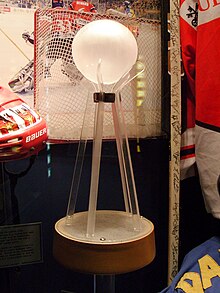Spengler Cup
The Spengler Cup ( French: Coupe Spengler ) is the oldest international ice hockey team tournament . The trophy of the same name was awarded for the first time in 1923. The participating teams from all over the world are invited by the host HC Davos . Since 1984 Team Canada has also played in a formation that does not correspond to the usual Canadian national team , but rather includes Canadian players from European clubs. The tournament takes place every year between St. Stephen 's Day and New Year's Eve in the ice rink in Davos , Switzerland .
history
With the foundation of the challenge trophy went aloud foundation document about "the youth by the First World War to bring together warring nations in sporting contacts again." Mutual understanding and trust should be found and promoted in a fair, friendly trial of strength.
The name of the tournament goes back to the ice hockey enthusiast founder Carl Spengler , the son of Alexander Spengler , who made Davos famous as a health resort .
Facts
Six teams take part in the tournament every year. The hosts HC Davos and, since 1984, Team Canada - an all-star team consisting of Canadian players active in Europe. In addition to the two teams, there are four teams that usually differ from year to year. Since the field of participants was expanded to six teams in 2010, there has been one Swiss and three foreign teams.

After the Swiss Indoors in Basel , the Spengler Cup is the second largest annual Swiss sports event. It has a budget of around 8.5 million Swiss francs (as of 2006), of which 30 percent is sponsorship. The main sponsor of the tournament has been UBS since 1985 .
The tournament will be broadcast live on television in five countries. Between 150 and 200 media professionals are accredited. Thanks to a mostly sold-out stadium, the Spengler Cup reaches more than 80,000 spectators in these six days.
mode

Traditionally, a simple round with five teams was played until 2009 , that is, each team played once against each other team. From 1986 , the two best-placed teams in the qualifying round competed against each other in a final game to determine the tournament winner.
In order to keep the five-day tournament exciting until the last day of the preliminary round, the mode was modified in 2010 . The tournament was expanded to six teams and at the same time a second Swiss team was added. The teams are divided into two groups of three teams each. After the preliminary round, the first in the group are qualified for the semifinals, the teams in places two and three play the other semifinalists crosswise. The two semi-final winners ultimately determine the tournament winner. The finale will continue - as it has been since its introduction in 1986 - traditionally kicked off on December 31st at 12:00.
Scoring
In the preliminary round, the winner of a game receives three points, the loser none. If the game ends in a draw after 60 minutes, an extra five minutes will be played. Since the Spengler Cup 2015, players have played 3 against 3 in extra time . If the game is still a draw after that, the winner will be determined by a penalty shoot-out. In this case, the losing team receives one point, as well as if it loses in the five-minute extra time.
Winners list
Team Canada is the record winner with 16 successes.
Record winner
- 1923: Oxford University 1 victory
- 1924: Oxford University and Berliner SC 1 victory each
- 1925: Oxford University 2 victories
- 1926/27: Oxford University and Berliner SC 2 wins each
- 1928-30: Berliner SC 3 wins
- 1931: Oxford University and Berliner SC 3 wins each
- 1932-36: Oxford University 4 wins
- 1937: Oxford University and LTC Prague 4 wins each
- 1938-40: Oxford University, LTC Prague and HC Davos 4 wins each
- 1941-47: HC Davos 5-7 wins
- 1948-50: HC Davos and LTC Prague 7 wins
- 1951-2016: HC Davos 8-15 wins
- 2017-2018: HC Davos and Team Canada 15 wins each
- 2019-: Team Canada 16 wins
Web links
Individual evidence
- ↑ Davos Revue, December 2003
- ^ Spengler Cup Davos. Retrieved May 8, 2017 .
- ↑ Presenting and Gold Partner | Spengler Cup. Retrieved May 8, 2017 .
- ↑ topsport.com Which is the second Swiss team?
- ↑ List of winners. Retrieved December 31, 2012 .


